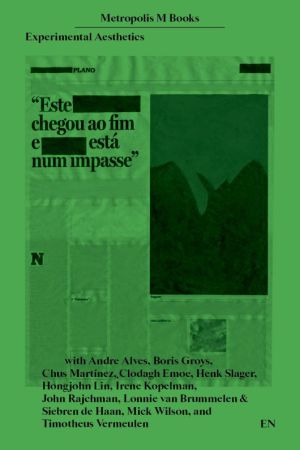Experimental Aesthetics
Editor: Henk Slager
Final Editor: Annette W. Balkema
Publisher: Metropolis M Books, 2014
Contributions by Andre Alves, Lonnie van Brummelen & Siebren de Haan, Clodagh Emoe, Boris Groys, Irene Kopelman, Hongjohn Lin, Chus Martinez, John Rajchman, Henk Slager, Timotheus Vermeulen, and Mick Wilson.
Today, both the practice and understanding of artistic research are encompassed by increasingly rigidifying forms of academization. This asks for a thorough conceptual reassessment of that originally artistic field. Indeed, many questions have been lurking in the wings for some time now. Does the present conceptual impact of artistic research still cover its original and radical drive? Is artistic research still related to processes of experimental thinking and creating? Or does a pervasive institutionalization urge to reset the ever-narrowing framework of artistic research?
The present publication intends to explore topical potentialities of an alternative and more strategic manner of dealing with artistic practices. Therefore, the texts deliberately refer again to the concept of aesthetics. Since contemporary thinkers such as Alain Badiou and Jacques Rancière have initiated to redefine the aesthetic domain, aesthetics seems once again to point to extra-territorial frameworks able to avoid the production of instrumentalizing concepts. Indeed, a topical understanding of aesthetics appears to be astoundingly compatible with what was once advocated by artistic research, i.e. the self-reflexive and self-critical capacities of artists engaging in configurations of understanding and signification.
In light of a topical reconsideration of the aesthetic regime, a first exploration took place during the project The Judgment is the Mirror (Living Art Museum, Reykjavik 2013). In particular, attention was drawn to how the current artistic discourse and its profound focus on method and knowledge production is at risk of losing sight of the role of critical judgment—after all a core concept in Kantian aesthetics. Specifically, the unique character of the aesthetic judgment—offering a critical mirror reflecting both the judgment and how it comes into being—makes clear that the aesthetic as such represents a dimension preceding a transparent methodology and an epistemological result. Therefore, the aesthetic process requires a manner of judgment that is capable of prolonging the gap between aesthetic apprehension and methodological deduction so that any claim to knowledge could be delayed as a “not yet.”
The very issues of aesthetics and productive delay of knowledge were at the core of the project Joyful Wisdom (Rezan Has Museum, Parallel Event Istanbul Biennial, 2013). In line with Nietzsche’s Gaya Scienza, essayistic presentations of eight artistic situation-based thinking processes continued the quest for an aesthetics that hovers on the border of judgment and affect in an attempt to be liberated from the freezing order of academic knowledge. The potential of a radical choice loomed up, foreboding the course of being adrift to the point of a black out of the senses, an epistemic guerilla, and making an untimely plea for speculative and symbolic forms of understanding.
The current project Aesthetic Jam is part of the 9th Taipei Biennial (2014) and connects to Nicolas Bourriaud’s curatorial concept of The Great Acceleration. This concept points here to the urge of a global refoundation of the notion of aesthetics deploying various topical perspectives such as antroposcene, object-oriented ontology, and new materialism. Yet, Aesthetic Jam also stresses the bond between aesthetics and experimental processes of making art. A zero-degree exhibition plan developed by co-curators Hongjohn Lin and Henk Slager hosted a relay-type series of three production periods and additional presentation moments. Participating artists not only produced new work, but also continuously engaged in adaptation of the display system and public discussions of the material conditions and relevant conceptual frameworks of both the exhibition and their art making for Aesthetic Jam.
As an elaboration on aforementioned research projects, a publication has been developed in collaboration with Metropolis M Books. Deriving from a multitude of perspectives and lines of thought, this publication intends to question anew the concept of aesthetics and its relevant positions and situations. Could a novel concept of aesthetics reveal different forms of interest in and processes of artistic thinking? Could experimental aesthetics as an undisciplinary methodology distinctive from a theoretical and academic philosophy be in the forefront of artistic practices? Could a topical understanding of aesthetics have the power to reframe the concept of artistic research?
A number of Aesthetic Jam participants such as Lonnie van Brummelen & Siebren de Haan, Irene Kopelman, Hongjohn Lin, Mick Wilson, Andre Alves, and Clodagh Emoe delve into their art making and the questions stated above. In addition, the publication contains contextualizing texts by authors known for their critical reflections on the current impact of aesthetics such as Boris Groys, Chus Martinez, Timotheus Vermeulen, and John Rajchman.


